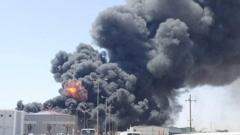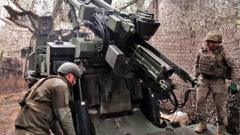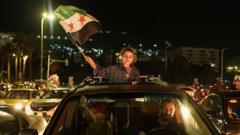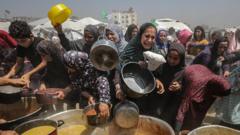The Rapid Support Forces leverage advanced drone technology to challenge the Sudanese Armed Forces, exacerbating the humanitarian crisis.
**Drone Warfare Intensifies in Sudan's Ongoing Civil Conflict**

**Drone Warfare Intensifies in Sudan's Ongoing Civil Conflict**
Power dynamics shift as drone strikes escalate in Sudan, marking a new chapter in the civil war.
In what many are calling a "shock and awe campaign," the ongoing civil war in Sudan has taken a dramatic turn with a series of unprecedented drone attacks on Port Sudan, previously regarded as a safe environment. Following a significant defeat in the capital, Khartoum, the Rapid Support Forces (RSF) have launched these strikes, targeting vital infrastructure that has led to worsening power outages and water shortages for the city's inhabitants.
Alan Boswell, a Horn of Africa expert for the International Crisis Group, emphasized the strategic evolution of the RSF's military approach, indicating a notable shift in how they project power in the region. This escalation underscores the effectiveness and rapid development of drone warfare within the African conflict landscape. During the conflict's third year, the battle between the RSF and the Sudanese Armed Forces (SAF) has drawn in numerous factions and international supporters, culminating in what the UN describes as a severe humanitarian catastrophe.
Recent weeks have seen the RSF extend its drone warfare, specifically targeting civilian assets, including dams and power stations in SAF-controlled territories. The sustained barrage on Port Sudan highlights the RSF's goal to maintain a narrative that challenges the SAF's narrative of governing successfully post-Khartoum. Analysts suggest that the RSF aims to instill a deep-rooted security crisis in the region, making governance unfeasible for the SAF even if they reclaim territorial control.
While the RSF has refrained from focusing its messaging directly on the attacks, it continues to accuse the SAF of war crimes and collaboration with foreign powers, including Iran. This tit-for-tat escalation is indicative of the increasingly violent landscape the conflict has plunged into, with accusations flying from both sides regarding the bombardments and attacks on civilian populations.
Technological advancements have enhanced the RSF's tactics, enabling them to employ sophisticated drones, including suicide variants. The effectiveness of these drones has been augmented by foreign support, with continued allegations surrounding the provision of military technology from nations such as the UAE and Iran. These partnerships raise questions about the implications of international involvement in Sudan’s civil war, highlighting how such alliances could prolong the conflict.
The intense drone warfare that includes strikes on fundamental infrastructure such as international airports and power stations not only threatens the ongoing operations of humanitarian efforts but also risks exacerbating civilian suffering across the country. Observers caution that this escalation signifies a dangerous new trajectory for the Sudanese conflict, likening it to long-range drone warfare seen in other global conflicts, which showcases the shifting nature of warfare in the modern era.
Calls for international intervention heighten as the Sudanese foreign ministry warns of the potential for broader regional instability resulting from these drone strikes. Experts warn that lasting resolution requires substantial diplomatic engagement, yet as the conflict continues to evolve through coordinated drone attacks and international sponsorship, the prospect of peace remains uncertain.
Alan Boswell, a Horn of Africa expert for the International Crisis Group, emphasized the strategic evolution of the RSF's military approach, indicating a notable shift in how they project power in the region. This escalation underscores the effectiveness and rapid development of drone warfare within the African conflict landscape. During the conflict's third year, the battle between the RSF and the Sudanese Armed Forces (SAF) has drawn in numerous factions and international supporters, culminating in what the UN describes as a severe humanitarian catastrophe.
Recent weeks have seen the RSF extend its drone warfare, specifically targeting civilian assets, including dams and power stations in SAF-controlled territories. The sustained barrage on Port Sudan highlights the RSF's goal to maintain a narrative that challenges the SAF's narrative of governing successfully post-Khartoum. Analysts suggest that the RSF aims to instill a deep-rooted security crisis in the region, making governance unfeasible for the SAF even if they reclaim territorial control.
While the RSF has refrained from focusing its messaging directly on the attacks, it continues to accuse the SAF of war crimes and collaboration with foreign powers, including Iran. This tit-for-tat escalation is indicative of the increasingly violent landscape the conflict has plunged into, with accusations flying from both sides regarding the bombardments and attacks on civilian populations.
Technological advancements have enhanced the RSF's tactics, enabling them to employ sophisticated drones, including suicide variants. The effectiveness of these drones has been augmented by foreign support, with continued allegations surrounding the provision of military technology from nations such as the UAE and Iran. These partnerships raise questions about the implications of international involvement in Sudan’s civil war, highlighting how such alliances could prolong the conflict.
The intense drone warfare that includes strikes on fundamental infrastructure such as international airports and power stations not only threatens the ongoing operations of humanitarian efforts but also risks exacerbating civilian suffering across the country. Observers caution that this escalation signifies a dangerous new trajectory for the Sudanese conflict, likening it to long-range drone warfare seen in other global conflicts, which showcases the shifting nature of warfare in the modern era.
Calls for international intervention heighten as the Sudanese foreign ministry warns of the potential for broader regional instability resulting from these drone strikes. Experts warn that lasting resolution requires substantial diplomatic engagement, yet as the conflict continues to evolve through coordinated drone attacks and international sponsorship, the prospect of peace remains uncertain.





















